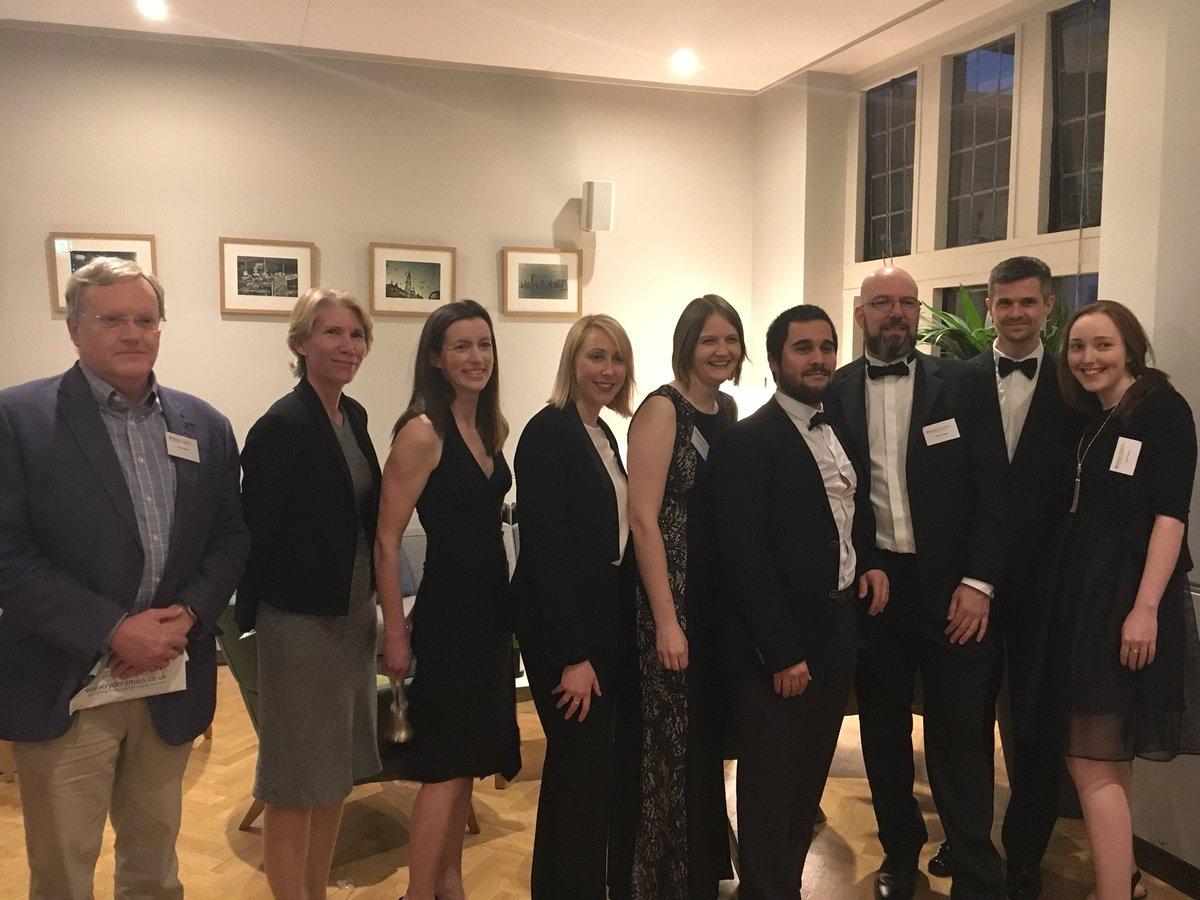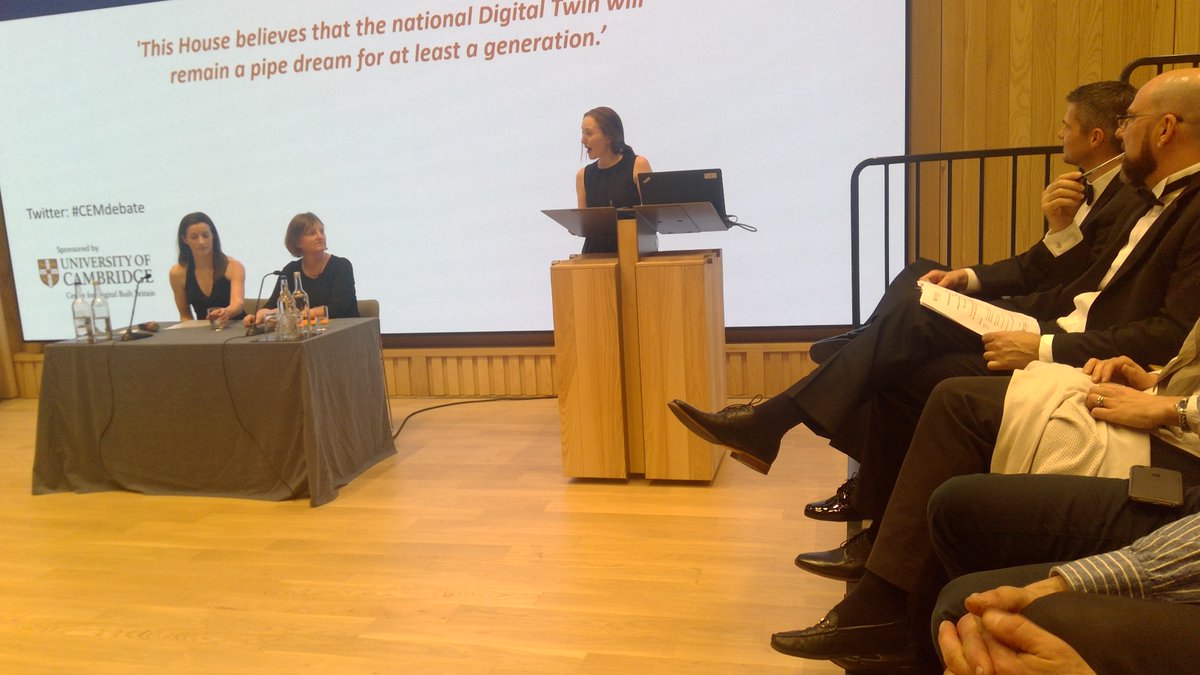
Submitted by Angela Walters on Thu, 03/05/2018 - 11:35
The Laing O’Rourke Centre for Construction Engineering Masters (CEM) Annual Debate brings informed insights and lively discussion to the subject of a national Digital Twin.
Attracting a full house at the Frankopan Hall at Jesus College, University of Cambridge, the moot was: This House believes that the national Digital Twin will remain a pipe dream for at least a generation. The motion invited a range of well-considered and persuasive arguments presented by the speakers for both debating teams with spirited contributions from the floor.
This year’s event was sponsored by the Centre for Digital Built Britain (CDBB) and a number of CDBB core team members, including Alexandra Bolton, Assistant Director of CDBB, Barry Blackwell, Lead Policy Official for Building Information Modelling (BIM) Department of Business, Energy & Industrial Strategy (BEIS), Amelia Burnett, CDBB Head of Engagement, Dr Ajith Parlikad, Senior Lecturer in Industrial Systems at the IfM, Dr Ioannis Brilakis, Laing O’Rourke Reader in Construction Engineering, and David Philp, CDBB L2 Communications Manager, met with the teams to explore possible lines of arguments to propose and oppose the motion. The CEM students themselves are experienced practitioners in construction and related sectors, many with an understanding of the opportunities and challenges presented by the concept of the Digital Twin. These preparatory meetings provided an opportunity for everyone to consider current state-of-play around the development of a national Digital Twin, including benefits and barriers.
“We were delighted to support this year’s CEM Debate and the very topical subject resulted in some excellent arguments and fascinating insights,” said Alexandra Bolton, Assistant Director of CDBB, who announced the winners, determined by audience vote. “The Construction Engineering Masters attracts the highest calibre of professionals in their field and this was evident in the quality of debate. Both sets of speakers presented very persuasive arguments making it extremely difficult for me to decide which way to vote.”
 The CEM Annual Debate is a significant component of the CEM two-year Masters of Studies programme, which is designed for experienced professionals already working at senior level in the sector. The programme aims to inspire and equip students to become future industry leaders with the ability to deliver change. The CEM Annual Debate tasks the students and speakers with developing the best arguments for their teams; participants are assigned to propose or oppose the moot requiring them to explore the topic from all perspectives.
The CEM Annual Debate is a significant component of the CEM two-year Masters of Studies programme, which is designed for experienced professionals already working at senior level in the sector. The programme aims to inspire and equip students to become future industry leaders with the ability to deliver change. The CEM Annual Debate tasks the students and speakers with developing the best arguments for their teams; participants are assigned to propose or oppose the moot requiring them to explore the topic from all perspectives.
The speakers for the two teams comprised Anna Stewart, Marcel Broekmaat, Gustav Wright, Jennifer Henderson, Sarah Dunne and Alex De Oliveira. The debate began with the first speaker (proposing) clearly and eloquently clarifying the terms and definitions of the proposal making reference to the National Infrastructure Commission. Political and financial barriers to the development of a national Digital Twin were stated, arguing that a national Digital Twin is a noble idea that could not be delivered in reality.
The first speaker opposing the motion cited the current pace of digital change that, they argued, placed the national Digital Twin within realistic reach in the stated timeframe. There were many examples given of technological advancements in the built environment and the great strides already made in the implementation of BIM L2. The speaker referred to the development of the security-minded PAS1192-5 to counteract the opposition’s fears of data exposure. The proposing team highlighted the lack of a clear value proposition as a major hurdle to the delivery of the national Digital Twin, a point dismissed by the opposition, with theatrical flourish, as “baffling”.
When the debate opened to the floor there was no shortage of contributions from the audience that comprised fellow CEM students supporting the arguments presented by the speakers from their teams, academics from the Department of Engineering and invited industry professionals. Many lively comments included the potentially time-consuming task of digitising the UK’s heritage assets estate and lack of political will to carry the national Digital Twin project forward – particularly when government is under more pressing financial pressures. Surprises in technological developments over the past five decades, including smartphones replacing cameras, were offered as evidence to oppose the motion. What defined a Digital Twin and what is an appropriate time frame to consider as a generation proved to be subjects of contention throughout the debate.
The final two speakers picked up pace and momentum with quick-fire and direct arguments that were witty, sharp and compelling. Members of the invited audience voted for the Nays or the Ayes as they left the hall to gather in the bar in readiness to toast the winning team… the Nays. The motion had been successfully opposed.
Dr Kristen MacAskill, Construction Engineering Masters Course Director, who chaired the evening and presented Anna Stewart with an award for best speaker of the evening, said: “Our Annual Debate is a highlight of the CEM programme. Tonight demonstrated the ability of our students to work with a range of ideas, challenge the status quo, and to think beyond the traditional boundaries of their roles in industry.”
Read more about the Laing O’Rourke Centre for Construction Engineering Masters (CEM) here.
Read more about the Laing O’Rourke Centre for Construction Engineering Technology here.
Read more about the National Infrastructure Commission and digital twin here.
